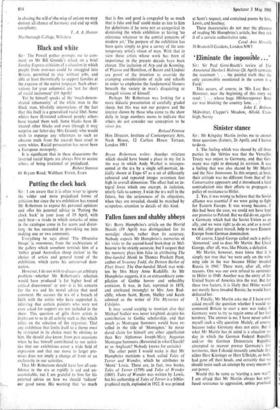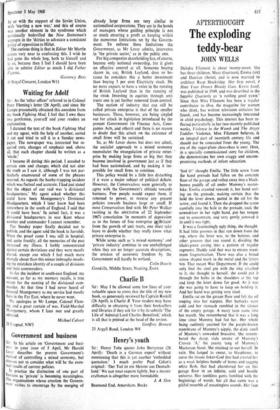Sinister stance
Sir: Mr Kingsley Martin invites me to answer three questions (Letters, 26 April), and I hasten to do so.
1. The feeling which was shared by all three parties in the 'thirties was that the Versailles Treaty was unjust to Germany, and that Ger- many was right to demand its revision. It was a feeling that was also shared by Mr Martin and the New Statesman. In this respect, at least, their attitude was no different from that of the Conservative appeasers and it introduced a fatal contradicticni into their efforts to propagate a policy of resistance to Hitler.
2. Yes, it was wrong to believe that the Soviet alliance was essential if we were going to fight for Eastern Europe. It was wrong because, if this had been the case, we could not have kept our promise to Poland. But we dill do so, against a Germany which had the Soviet Union as an ally, and we were right to do so, and as a result we did, after great travail, help to save Eastern Europe from German domination.
Of course, Llgyd George called such a policy 'demented,' and so does Mr Martin. But Lloyd George, after all, was, like Main, a defeatist.
Mr Martin, however, must know that it is simply not true that `we were only on the win- ning side in the war because Hitler invaded Russia in 1941.' There were, after all, other reasons. One was our own refusal to surrender to Hitler in 1940. Another was the entry of the United States of America into the war. But for these two factors, it is likely that Hitler would not merely have invaded Russia; he would have defeated her.
3. Finally, Mr Martin asks me if I have ever askekl myself the question whether I would re- commend Britain to start a new war today if Germany were to try to regain some of her lost territory. The answer is no, I have never asked myself such a silly question. Mainly, of course. because today Germany does not exist. But if what Mr Martin has in mind is a situation to- day in which the German Federal Republic and/or the German Democratic Republic attempted to recover prewar Germany's lost territories, then rshould instantly conclude that either Herr Kiesinger or Herr Ulbricht, or both, had gone off their heads, and certainly that we should resist such an attempt by every means in our power. Would this be same as `starting a new war'? I am afraid that Mr Martin always has con- fused resistance to aggression, unless practised by or with the support of the Soviet Union, with 'starting a new war,' and this of course was another element in the syndrome which continually bedevilled the New Statesman's attempts in the 'thirties to advocate a consistent policy of opposition to Hitler. The curious thing is that in Editor Mr Martin comes very near to confessing this. I wish he had gone the whole hog, both to himself and to us, because then I feel I should have been able to admire Editor as much I did Father Figures.







































 Previous page
Previous page